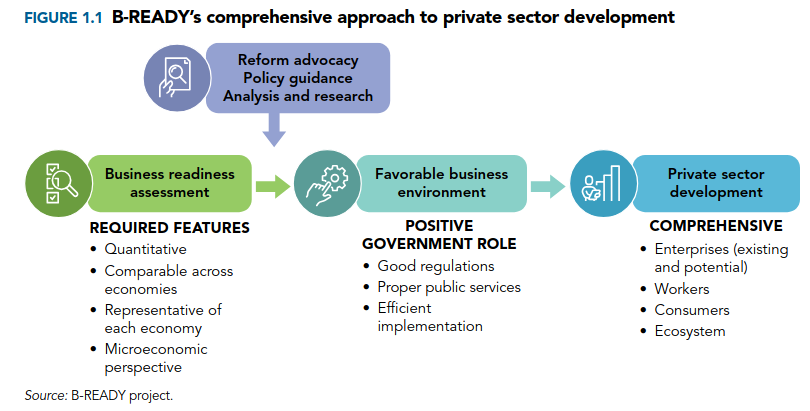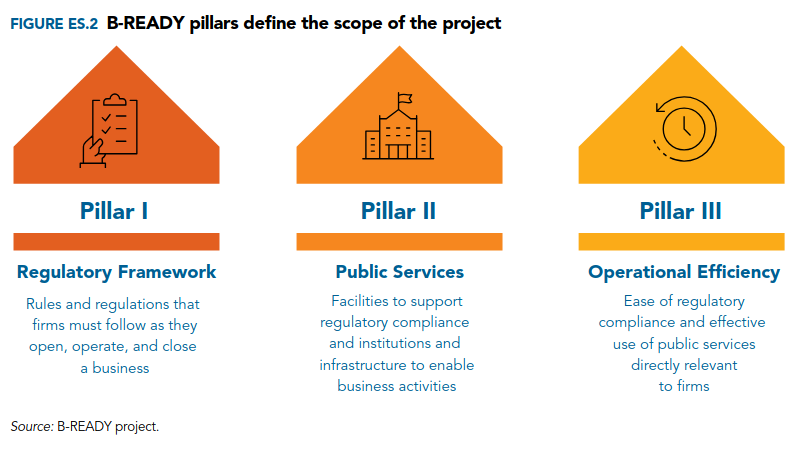B-Ready: The World Bank's New Business Environment Indicator
Published by Simone Zambelli. .
Check performance Bestpractice Internationalisation tools
In September 2021 - following extensive investigations that had already led to the suspension of the Doing Business 2021 Report - the World Bank decided to discontinue the publication of the Doing Business survey, as the external investigation revealed "serious ethical issues arising from the conduct of some former officials."
This decision gained significant international attention due to its practical implications for assessing the business environment in the countries considered and for the impact the Doing Business index had, up to that point, on research, analysis, and academic thought.
One of the main weaknesses highlighted by the World Bank's independent investigations was, first and foremost, the potential misuse of data and methodology to distort a country's position in the global ranking. Additionally, the methodology was not sufficiently geared toward measuring the reformist impact of a country in terms of labor rights and environmental sustainability, increasingly important themes for the development of future economies.
Three years after the discontinuation of the Doing Business report, the World Bank is now launching a new initiative called Business Ready (B-READY). This new report aims to evaluate the business and investment climate in 180 countries, with the objective of promoting economic reforms and incentivizing private investments, introducing some methodological adjustments to the most relevant indicators. The organization has frequently emphasized that the key points of the new report are: absolute transparency of the methodology, greater reliance on survey-based data, and reduced focus on country rankings to minimize the incentive for governments and officials to 'game the system,' that is, to promote ad hoc reforms primarily aimed at climbing the ranking.
The new B-READY report
As anticipated, B-READY adopts a more comprehensive approach, as illustrated in Figure 1.1. The new framework starts with an assessment of each country's business readiness, based on quantitative analyses, microeconomic perspectives, and comparability among different economies. The second pillar pertains to evaluating the business environment, where the role of the government is crucial to ensure adequate regulations, efficient public services, and effective implementation. The ultimate goal is to provide a synthetic evaluation of the private sector development in a broad sense, encompassing businesses, workers, consumers, and the entire economic ecosystem.

The B-READY report distinguishes itself from its predecessor with a more holistic vision, covering ten topics that follow the lifecycle of a business, analyzing key aspects such as accessibility for new international players, worker rights protection, taxation regimes, and dispute resolution efficiency. This structure is built on three main pillars (Figure 2):
- Pillar I: Regulatory Framework - Focuses on the rules and regulations businesses must follow to open, operate, and close an activity;
- Pillar II: Public Services - Aims to improve public services and the infrastructure necessary to support economic activities;
- Pillar III: Operational Efficiency - Addresses simplifying regulatory compliance and promoting the effective use of public services.

A particularly important aspect of the new report concerns the consideration of fundamental worker rights and the expansion of data collection beyond the boundaries of private enterprises, marking a step forward compared to previous methodologies.
While some criticisms remain valid, the renewed methodological framework is better positioned than its predecessor to evolve into a tool capable of balancing public and private interests.
Additionally, the public consultations for the new tool, recently initiated, represent another opportunity for the World Bank to embrace further suggestions to ensure an innovative and more inclusive report.
The challenges of the modern world indeed require tools that promote economic reforms without sacrificing fundamental rights and sustainability; where B-READY succeeds in integrating these priorities, it could become a positive reference for a new global development paradigm.
According to some analysts, even the reintroduction of national rankings, if managed transparently and with attention to social balances, could incentivize governments to compete constructively, focusing on innovation and sustainability. Countries like India, for example, could use the report's insights to combine economic growth with respect for social and environmental rights.
In conclusion, the new B-READY report represents a significant opportunity to address the shortcomings of the past and build a future where economic reforms can coexist with sustainability and equity. The new approach outlines a promising structure, which could become a reference point for balanced and inclusive global development, at a time when the search for new investment geographies appears more urgent than ever, given the growing geopolitical fragmentations.


